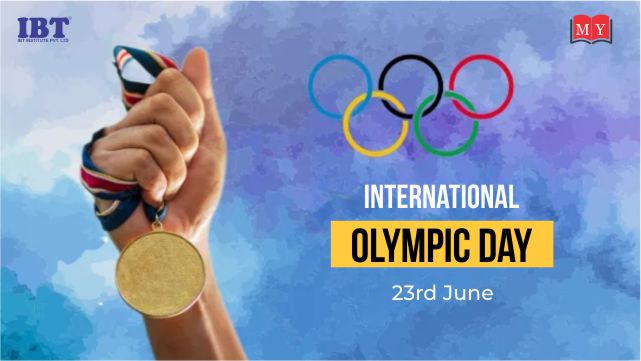International Olympic Day: 23rd June

International Olympic Day: A Global Celebration of Sport, Health, and Unity (June 23rd)
International Olympic Day, observed annually on June 23rd, is a global celebration that commemorates the founding of the modern Olympic Movement and the International Olympic Committee (IOC) in Paris on June 23, 1894. More than just a date on the calendar, it has evolved into a worldwide initiative to promote the Olympic ideals of excellence, friendship, and respect, encouraging people of all ages, backgrounds, and abilities to embrace the joy of sport and an active lifestyle.
The Genesis of Olympic Day
The idea for a dedicated "Olympic Day" was first proposed in 1947 by Dr. Josef Gruss, an IOC member from Czechoslovakia, during the 41st Session of the IOC in Stockholm. His vision was to create a day that would primarily promote the Olympic idea. This proposal was formally adopted in January 1948 at the 42nd IOC Session in St. Moritz. The responsibility for organizing this event was given to National Olympic Committees (NOCs), with a suggested date between June 17th and 24th, to honor the historical founding of the IOC by Baron Pierre de Coubertin.
The very first Olympic Day was celebrated on June 23, 1948, with nine NOCs participating: Austria, Belgium, Canada, Greece, Great Britain, Portugal, Switzerland, Uruguay, and Venezuela. The then IOC President, Sigfrid Edström, delivered a message to the youth of the world, emphasizing the importance of sport and the Olympic spirit.
In 1978, the Olympic Charter officially recommended that all NOCs "regularly organise (if possible each year) an Olympic Day intended to promote the Olympic Movement." This solidified its place as an integral part of the Olympic Movement's mission.
Pillars of Celebration: Move, Learn, Discover
Today, International Olympic Day is built upon three core pillars: Move, Learn, and Discover.
-
Move: This pillar emphasizes the importance of physical activity for everyone. It encourages people to get active, regardless of their age, gender, or athletic ability. Olympic Day events often include mass participation activities like fun runs, walks, dance events, and community sports festivals, providing opportunities for individuals and families to engage in various sports and games. The "Let's Move?" initiative, launched by the IOC in recent years, specifically highlights the benefits of playing sport and working out together for physical, mental, and social health.
-
Learn: Olympic Day serves as a platform for education about the Olympic values – excellence, friendship, and respect. Through school programs, workshops, and seminars, people learn about the history of the Olympic Games, the philosophy of Olympism, and how sport can contribute to positive societal issues like peacebuilding, inclusion, and cultural understanding. It's an opportunity to teach about fair play, equal opportunity, and global participation.
-
Discover: This pillar encourages individuals to explore new sports and activities. Many events on Olympic Day are designed to introduce participants to a variety of sports they might not have tried before, fostering a sense of curiosity and encouraging a lifelong engagement with physical activity. It's also about discovering the joy of movement and connecting with others through shared experiences.
Global Reach and Diverse Activities
International Olympic Day sees widespread participation from over 150 National Olympic Committees (NOCs) across the globe. Celebrations are incredibly diverse, adapting to the unique sports culture of each country. Common activities include:
-
Olympic Day Runs: These non-competitive runs or walks are a hallmark of the day, inviting people of all fitness levels to participate.
-
Community Sports Festivals: Local parks and recreation centers often host mini-Olympics, offering opportunities to try various sports.
-
School Programs: Educational institutions integrate Olympic values into their curriculum, organizing sports days, quizzes, and poster-making competitions.
-
Athlete Interactions: Olympians and sports icons often participate in events, inspiring young people and sharing their experiences.
-
Cultural Events: Exhibitions, concerts, and displays of Olympic memorabilia contribute to the cultural aspect of the celebrations.
-
Digital Activations: Social media campaigns using hashtags like #OlympicDay and #MoveForPeace encourage people to share their stories and participate virtually.
The underlying message is consistent: to promote universal participation in sport, raise awareness of the benefits of physical fitness, and reinforce the unifying power of the Olympic Movement.
The Significance Beyond Sport
International Olympic Day is more than just an annual sports event; it's a powerful reminder of the transformative power of sport to build a better world. It highlights:
-
Health and Well-being: In an era where physical inactivity is a growing global concern, Olympic Day actively promotes regular physical activity for healthy bodies and minds.
-
Social Cohesion: By bringing people together through shared sporting experiences, it fosters community, combats loneliness, and promotes a sense of belonging.
-
Values Education: It reinforces the importance of values like excellence, friendship, respect, and fair play, which are crucial for personal development and global harmony.
-
Inclusion: Olympic Day events are designed to be inclusive, welcoming people of all ages, genders, abilities, and social backgrounds.
-
Peace and Unity: The Olympic rings, symbolizing the five inhabited continents united by sport, serve as a powerful emblem of global unity and the potential of sport to transcend differences.
As International Olympic Day is celebrated on June 23rd each year, it serves as a potent reminder of Baron Pierre de Coubertin's vision and the enduring power of the Olympic Movement to inspire, educate, and unite people worldwide through the universal language of sport.
2 likes |
0 comment
 4.5/5
4.5/5








